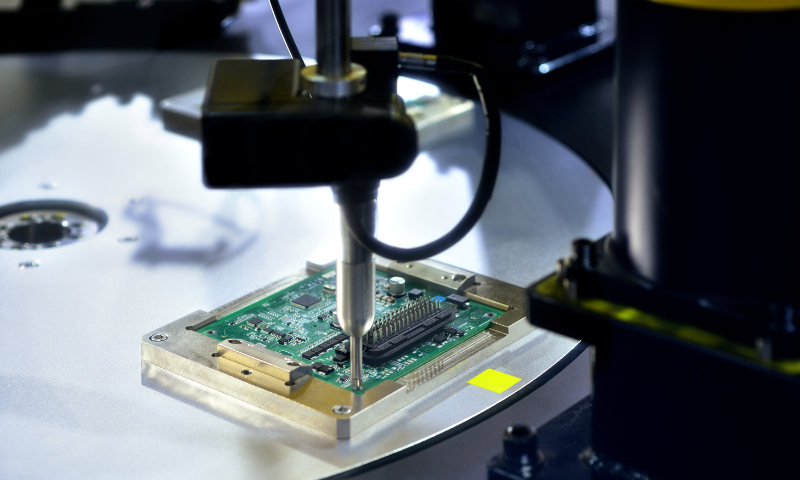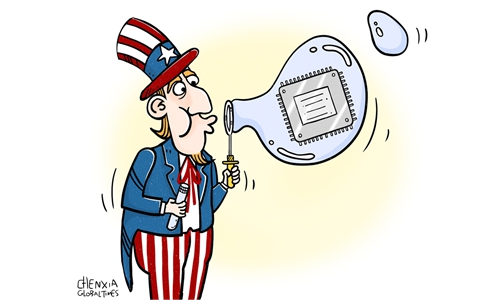US 2-way strategy to curb China backfires, set to weaken competitiveness of own chips: analysts
Hegemonic move to weaken competitiveness of own chips: analysts

Production of semiconductor chip File photo: VCG
US Commerce Secretary Gina Raimondo said in a public speech that the US has adopted two strategies - an offensive one and a defensive one - to tackle China's competition in the chip industry, outlining its approach in containing China's high-tech rise amid an increasingly intense rivalry between the world's two largest economies.
Raimondo made the remarks while introducing the implementation plan for the Biden administration's Chip and Science Act during a speech at Georgetown University on Thursday, local time.
Li Zheng, an assistant researcher with the Institute of American Studies at China Institutes of Contemporary International Relations, said the statement could represent the first time a senior US official has publicly clarified the administration's systematic strategy in suppressing Chinese chips.
Although the US has been "sticking to" these tactics for some time, this public speech once again "set the tone" for its basic strategy against China, Li told the Global Times on Friday.
When asked how the law and export controls on China would affect China-US relations, Raimondo said, "As I think about our competition with China… we have an offensive strategy and a defensive strategy. The defensive strategy is export controls, denying China access to our super high-end technology. But the offensive strategy is more important, which is investing in America."
Explaining the "offensive strategy," Raimondo said that if the US invests in its own talent, allows entrepreneurs and researchers to do what they do best, allows American companies to do what they do best, innovate, compete and scale, then the US can win in any competition with anyone in the world, and win in innovation.
For the "defensive strategy," Raimondo stated that she is eager to continue working with partners and allies "to create a diverse, resilient, and sustainable supply chain, establish technology standards that align with our values, and invest in our shared digital future. The correct way to implement export controls is to work with US allies and partners."
The core aim of the US at the moment is to hinder China's scientific and technological progress, drag down China's development, and maintain its hegemony. Any country that is likely to surpass or about to surpass it will be "strangled," Gao Lingyun, an expert at the Chinese Academy of Social Sciences in Beijing, told the Global Times on Friday.
The Commerce Department, which Raimondo is responsible for, is the main department responsible for US export controls, and many specific policies come from its sub-agency, the Bureau of Industry and Security (BIS). Raimondo has emphasized on multiple occasions the need to maintain the US' leading position in high-end technology to safeguard US national security, and has warned of "competition risks" from China.
After running out of "defensive tactics," from putting Chinese firms on its Entity List to releasing so-called export control rules, in August 2022, US President Joe Biden signed the Chips and Science Act into law, marking another step forward for Raimondo's "offensive strategy."
Raimondo revealed during her Thursday speech that the US will use funds from the $52 billion Chips and Science Act to create at least two large-scale logic fabs for the manufacture of semiconductors, along with multiple high-volume advanced packaging facilities, by 2030.
US-based manufacturing plants, known as "fabs," will produce advanced memory chips "on economically competitive terms," Raimondo said.
However, Gao pointed out that chips made in the US are bound to be more expensive after relocating from places with cheaper labor costs. This cost will eventually be passed on to American companies, and excessive costs and prices will also weaken the competitiveness of American chips.
"After tossing around, the US will finally find that using subsidies to maintain its so-called leadership status is set to fail. Globalization will be its own way out," Gao said.
Meanwhile, the blockade of China does not mean that China will stand still, and other countries are also accelerating their semiconductor-related research amid the US' increasingly protectionist mindset, said the expert.
Top Chinese authorities have been stressing the significance of strengthening basic research for higher-level self-reliance on multiple occasions, saying that greater strength in science and technology is the only path to building China into a world leader in the field.
While the US goes against globalization in seeking a technology hegemony, China has been stressing its approach of being a strong supporter of global cooperation and vowing further opening-up.
Zhang Guangjun, Vice Minister of Science and Technology, told a press conference on Friday that facing the future, China's door to openness and cooperation in science and technology will only open wider and wider.
"We will join hands with other countries to contribute more Chinese wisdom and strength to promote human progress and build a better homeland, and shoulder the mission of technological innovation to build a community with a shared future for mankind," Zhang said.


